T. Belman. Nothing cited makes the case that Farange is antisemetic. To suggest that a person is anti-globalist or anti-Communist, in no way is evidence that he is an antisemite. To make a headline of him being accused of using antisemitic tropes is nothing short of a smear job. Many respectable politician, including Trump, are falsely accused of racism or antisemitism by their opponents. Shame on TOI
They’ve asked to leave Europe, but Britons must this week choose new EU parliamentarians. Heading the polls is Nigel Farage, a right-winger increasingly criticized by Jewish groups
By ROBERT PHILPOT, TOI 20 May 2019,
Brexit Party leader Nigel Farage attends a European Parliament election campaign event in Pontefract, northwest England, on May 13, 2019. – The newly-formed Brexit Party, which wants a clean break from the EU, has doubled its lead over other British parties in an opinion poll out Sunday on the European Parliament elections. Despite voting in a referendum to leave the European Union in 2016 Britain is braced to take part in the European Parliament election on May 23. (Oli SCARFF / AFP)
LONDON — They are perhaps the most bizarre elections in which Britons have ever been asked to participate. This Thursday, the country goes to the polls to elect members of the European Parliament — two months after Britain was supposed to have left the European Union.
The Brexit delay — caused by repeated heavy defeats in parliament for British Prime Minister Theresa May’s unpopular withdrawal agreement deal with the EU — has left Britain legally required to participate in the pan-Europe elections.
The contest is fast turning into a replay of the ugly and divisive 2016 referendum at the close of which Britain voted to leave the EU.
At the center of the campaign is Nigel Farage, or “Mr. Brexit” as US President Donald Trump approvingly calls him in tribute to his long-running effort to end British membership in the EU.
Farage’s newly formed Brexit party is, astoundingly, leading the opinion polls, with 35 percent of Britons apparently planning to vote for it. It accuses May’s governing Conservative party, as well as Jeremy Corbyn’s opposition Labour party, of failing to honor the results of the referendum, and wants the UK to cease negotiations with the EU and pull out without a deal.
But Farage, a controversial populist with close links to European far-right leaders, also now faces allegations of deploying anti-Semitic “codewords” on a far-right US talk show.
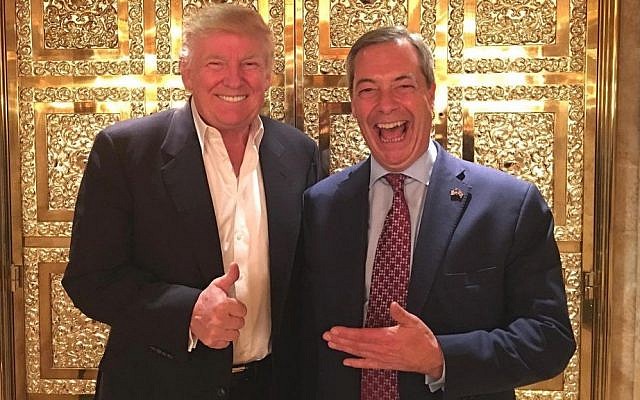
A series of investigations by The Guardian newspaper recently uncovered at least six interviews, conducted between 2009 and 2018, that Farage gave to Alex Jones on the latter’s eponymous show. Jones has been described as “the most prolific conspiracy theorist in America” by the Southern Poverty Law Center.
Appearing on Jones’s Infowars website, The Guardian alleges, Farage “openly discussed conspiracy theories, some of which have been linked to anti-Semitism.” The Brexit party leader, who is currently a member of the European Parliament, is accused of repeatedly using words and phrases such as “globalists” and “new world order” which frequently feature in anti-Semitic discourse.
Farage has been sharply criticized by Jewish groups and the Jewish press. The Community Security Trust, which monitors anti-Semitism and protects Jewish venues and events, suggested that Jones was “a notorious conspiracy theorist who should be beyond the pale for any mainstream politician.”
“For Jones’s conspiracy-minded audience,” a spokesman told the paper, “Farage’s references to ‘globalists’ and ‘new world order’ will be taken as familiar codewords for antisemitic conspiracy theories.”
The Board of Deputies added that it was “vital that our politicians distance themselves from conspiracy theories and conspiracy theorists, including those who trade in anti-Semitic tropes.”

In an editorial, the Jewish Chronicle accused Farage of “not merely flirting with anti-Semitic tropes but, in his interviews with Mr. Jones, utilizing them.”
As campaigning enters its final stretch, the controversy has deepened with The Guardian making further allegations against Farage, suggesting that he had “used themes associated with anti-Semitism” to attack the Jewish philanthropist and financier George Soros.
Soros is a strong supporter of the EU and has backed groups in Britain campaigning for a second referendum.
Farage, The Guardian reported, last year described Soros as “in many ways… the biggest danger to the entire western world” and said he was trying to “undermine democracy and to fundamentally change the makeup, demographically, of the whole European continent.”

He is alleged to have said Soros “wants to break down the fundamental values of our society and, in the case of Europe, he doesn’t want Europe to be based on Christianity.” Farage also praised the Hungarian leader Viktor Orban for having the “courage to stand up against him.”
Critics, such as the Board of Deputies, say that by its relentless attacks on Soros, Orban’s government is “whipping up prejudice” and deploying “vivid anti-Semitism.”
However, the Brexit party has defended Farage and dismissed The Guardian’s revelations, issuing a statement in which it claimed there was “absolutely nothing in any of these remarks to substantiate an allegation of anti-Semitism.”
“It is an exceptionally feeble attempt to portray Nigel Farage as an anti-Semite. Anybody with an iota of intelligence or objectivity will see right through it,” the party claimed.
‘Not so much a dogwhistle to anti-Semites as a fog horn’
Farage’s opponents, though, seem intent on pursuing the issue. Joan Ryan, a parliamentarian who earlier this year quit the Labour party over anti-Semitism to join the newly formed Change UK party, wrote this week that Farage’s attack on Soros were “not so much a dogwhistle to anti-Semites as a fog horn.”
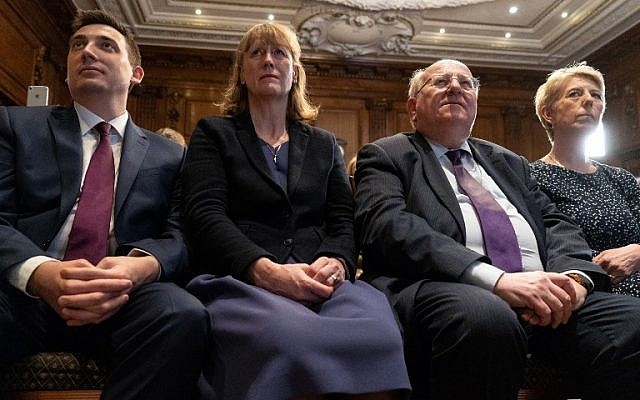
It is not the first time that Farage has faced off against Soros. Last year, for instance, he brushed aside allegations of Russian meddling in the Brexit referendum, and called instead for an investigation into “the extent to which George Soros’s Open Society has attempted to change the political climate, not just in Britain, but [the] entire Western world.”
The Brexit party leader has faced criticism in the past for “careless” language when discussing sensitive topics. In 2017, for instance, the Board of Deputies said he had “crossed the line into well-known anti-Semitic tropes” when discussing the “money and influence” of the “Jewish lobby” in America on his LBC radio show.
Farage has certainly done nothing to disguise his admiration for various European far-right parties. In 2017, he endorsed Marine Le Pen’s French presidential bid and campaigned for the far-right Alternative for Germany party.
But Farage, who left politics after the 2016 referendum only to rejoin the fray this year over May’s “betrayal” of Brexit, is an astute enough politician to recognize the electoral danger posed by the tag of extremism.
Last month, the Brexit party immediately dismissed one of its senior officials after he was found to have made social media posts about Jews, Muslims and other minority groups. Michael McGough, the party’s former treasurer, referred online to the former Labour leader, Ed Miliband, and his brother, David, the former foreign secretary — sons of Jewish immigrants — as having “the shortest of roots. Transient folk, they have no loyalty to the UK.”
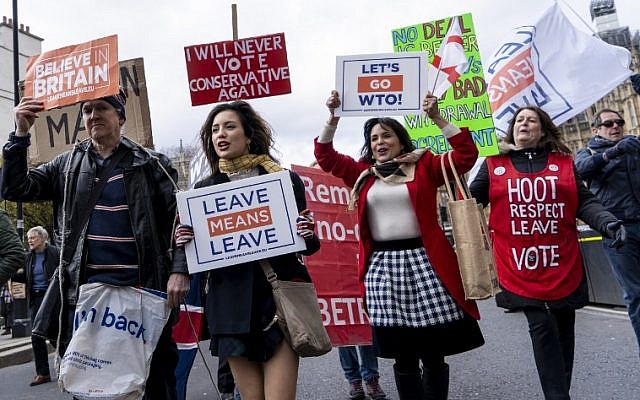
Farage has also won the seal of approval of two Jewish former Tory supporters who are running for the party in London. Lance Forman, owner of H. Forman and Son, the UK’s oldest smoked salmon business, showered praise on the Brexit party leader as having “done more than anyone in Britain to awaken the spirit of freedom and democracy.”
This week, Forman strenuously defended Farage against charges of anti-Semitism, telling the Jewish News: “I have a very sensitive antenna. I have never sensed that with Farage. While with Corbyn I sense it extraordinarily strongly.”
“When people talk about globalists, this has nothing to do with anti-Semitism,” Forman argued. “This is about big multinational companies taking over the world.” He added: “I agree there’s a problem with globalists. The problem is with bureaucrats in the EU.”
Forman, the son of a Holocaust survivor, has himself been targeted by anti-Semites during the campaign, with police investigating the daubing of a 30-foot swastika on his business’ East London headquarters.
Also running for the Brexit party in London is Simon Marcus, who was a Conservative parliamentary candidate in the capital in the 2015 general election. His defection, he also told the Jewish News, was due to May’s handing of Brexit.
“We want to send a message to an out-of-touch Westminster elite who are doing their best to undermine the will of the people,” he said. He similarly defended Farage against allegations of anti-Semitism.
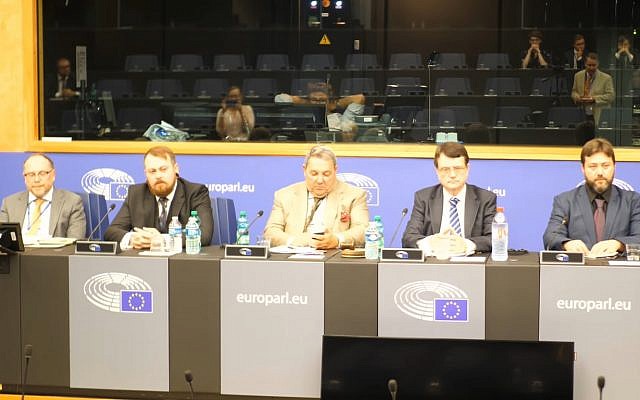
Meanwhile, in UKIP
Farage’s decision to form the Brexit party came after he and other leading figures resigned from the anti-EU United Kingdom Independence Party (UKIP) last December. The party, of which he twice served as leader, had become “pretty obsessed with the issue of Islam” and appeared to be wanting to fight “a religious crusade,” he said.
Farage also attacked UKIP’s embrace of Tommy Robinson, the onetime head of the now virtually defunct anti-Muslim English Defence League, who has become a hero to many on the British and American far right.
Robinson is running as an independent in the northwest of England. His campaign has seen attacks by his supporters on journalists and Robinson has twice been doused in milkshake by members of the public objecting to his far-right activism. “That’s what you get for being a fascist,” an approving voter suggested after witnessing one of the incidents earlier this month in the town of Warrington, close to Manchester.
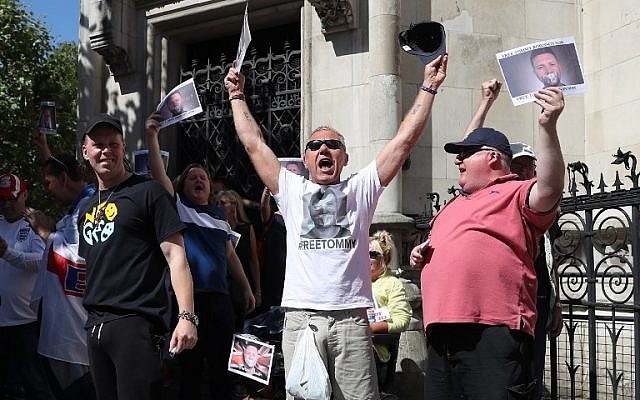
Even under Farage’s more moderate leadership, UKIP managed to achieve only a smattering of Jewish support. It fared much better among the electorate as a whole. In 2015, the party put in its best-ever general election performance and won 12.6 percent of the vote across the country. But polls showed UKIP won a mere 0.6% of the Jewish vote, despite Farage’s attempts to tout the party’s alleged pro-Israel credentials.
By the time of the 2017 general election, Farage had departed as leader and, in the wake of the Brexit vote, UKIP support nationally collapsed. Once again, moreover, Jews appeared to take a particularly dim view of the party. A poll for the Jewish Chronicle showed that, after Labour, UKIP was seen as the party with the biggest problem with anti-Semitism. Last year, it refused to adopt the International Holocaust Remembrance Alliance definition on anti-Semitism.
With its lurch to the far right, and Farage competing against it for the hardline pro-Brexit vote, UKIP appears to be heading for a poor showing this Thursday. Jewish backing for the party, already likely to be minimal, will not have been helped by revelations about alleged racial slurs made by one of its most high-profile candidates, Carl Benjamin.
The self-described “anti-political correctness entertainer” posted videos on YouTube in which he reportedly repeatedly used the n-word, and said Jewish people “needed to drop the identity politics.” He added: “I’m sorry about the Holocaust, but I don’t give a s***.” An unrepentant Benjamin responded to the story by saying: “BREAKING NEWS: Anti-political correctness entertainer has used naughty words for fun.”
Change UK struggles
At the other end of the political spectrum, Thursday also marks the first electoral test for Change UK, which was formed by MPs who resigned from the Labour party in February in protest at Jeremy Corbyn’s leadership.
Among the Labour defectors were Jewish MP Luciana Berger and Ryan, who chairs Labour Friends of Israel. The anti-Semitism crisis which has rocked the party under Corbyn’s leadership was cited by a number of the parliamentarians for their decision to quit, and Berger herself was a prominent victim. The Labour rebels were later joined by three Conservative parliamentarians who oppose Britain leaving the EU and accuse May of allowing her party to drift to the right.
Polls indicate that Change UK may struggle next week. Keen to show their strength ahead of a potential second referendum, anti-Brexit voters seem to be rallying principally around the centrist Liberal Democrat party. Its unexpectedly strong performance in local elections earlier this month – attributed by many to its ardently pro-EU stance – has somewhat crowded out Change UK.
Despite teething problems, Change UK hopes to do well in London, which remains a bastion of opposition to Brexit, and the southeast of England. Among the candidates it is fielding in the capital is Karen Newman, the vice chair of Liberal Judaism and a member of the Board of Deputies. An activist for a Jewish LGBT group, she this week urged Jews to vote for Change UK: “A Nigel Farage-driven Britain, via his own party, or by forcing the Tories to tack to the right in an attempt to shore up their vote, will be a less tolerant and more hostile space for Jews.”
“As Jews know more than most, the natural state of Europe is not to be at peace,” she wrote. “The political entity that has delivered more than 70 continuous years of peace is what we now call the European Union. A United Kingdom (which Brexit also threatens) within a strong Europe is the best way of preserving the values we hold dear, and the open, tolerant society which we love.”

Change UK’s fortunes will, in part, be determined by how many Labour voters abandon their traditional allegiance and switch to it. Jewish backing for Labour, which plummeted to 13% at the 2017 general election, is unlikely to have recovered given the ongoing allegations of anti-Semitism in the party.
That row was reignited last month when the party selected as a candidate in the elections a former member of its National Executive Committee who in 2016 suggested that “Labour’s Blairite right wing have used the smear of anti-Semitism to undermine Jeremy Corbyn’s leadership.” Martin Mayer reportedly made the comments in an email entitled “How Israel lobby manufactured UK Labour party’s anti-Semitism crisis.” Mayer has said he regrets the remarks.
Polls show that, like the Conservatives, Labour is set for a bad night when the results come through. Polarization, a surge in support for the populist right, and deep-seated public anger with the country’s seemingly dysfunctional political system appear to be coming together in a perfect storm. Some analysts predict that the two main parties may record their worst-ever combined share of the total vote.
In the country’s current febrile state, few would predict what impact such a result might have on the future of British politics. One gloomy commentator this week even drew a comparison with Weimar Germany. “It would be trite to draw the modern parallels too tightly,” wrote The Guardian’s Martin Kettle. “Nevertheless, there are similarities with today’s Brexit-derived politics that cannot just be dismissed.”

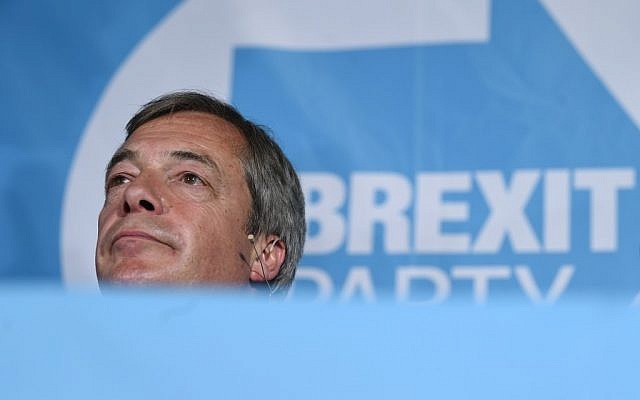


Leave a Reply
You must be logged in to post a comment.